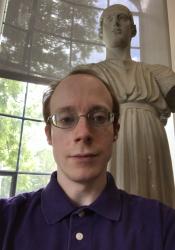
Each year, courses in Humanities First are taught by faculty from across the Humanities division. This year, we have professors from English, Philosophy, Classics, Middle Eastern Languages and Cultures, and German Studies. Learn more about them below!
Humanities 101: Autumn, 2025, "Gods and Monsters"

Joseph Bringman | I am a lifelong Seattleite, and I earned my undergraduate and graduate degrees at the UW. Captivated by ancient history, I study revolutions and revolutionaries in ancient Rome. When I am in the mood to give my boisterous imagination free range, I enjoy writing stories and novels that are often set in the ancient world; my latest novel, Periander the Avenger: The Final Son of Atlantis, explores an imagined lost civilization whose legends have long fascinated me. I also enjoy learning new languages, watching Jeopardy!, and coin roll hunting for wheat cents.
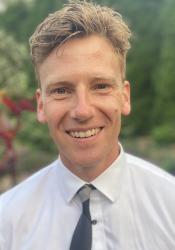
Sam Hushagen received his PhD in English literature from the University of Washington in 2019, after completing a dissertation on early-modern science and descriptive poetry. He researches the connections among poetry written between 1660 and 1850, philosophy of mind, and the history and philosophy of science to show how these areas can be seen in productive conjunction rather than as isolated pursuits. He is currently working on a book about landscape poetry and sense experience, and has published essays in The Wordsworth Circle, The William Carlos Williams Review, and Milton Quarterly. Sam began teaching at UW as a graduate student in the English department 2013. Before pursuing his doctorate, Sam was a UW undergraduate in English and CHID. He joins Humanities First as an Instructor for Humanities 101, 102, and 103 and as Program Coordinator. Sam can be reached at samhus85@uw.edu
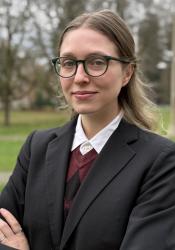
Lillian McCabe | Magic and the occult surround us. Tarot cards, astrological birth charts, fantasy novels, crystals: all of these are testaments to a sustained interest in unseen and hidden powers. Like religion and like science, magic too has a history. It is largely a history of being opposed to the others—magic is religion done wrong, or magic is bad science. My work looks at one chapter in this long history of magic, delving into premodern Islamic intellectual history to discover how premodern Muslim scholars wrote and thought about the meaning of magic and its relationship to religion and science. I am trained in the discipline of Religious Studies, a field dedicated to studying the history of religions, how they change and develop over time, and the ways in which societies shape and are shaped by religion. I received my PhD from Yale in 2024, my MTS (Masters of Theological Studies) from Harvard Divinity School, and my BA from Davidson College.
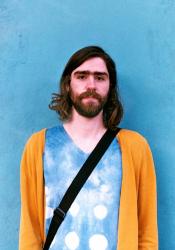
Dr. Alex McCauley works on ecology and political economy in nineteenth-century literature. Drownings, floods, swamps, sinking islands, liquefying crowds—that’s his material. Dr. McCauley tracks those interests back to the 2004 Indian Ocean tsunami, when he was living in Thailand and went to the coast with my high school to help out with relief efforts. That specific flood has led Dr. McCauley to global water issues: too much water, or not enough, everywhere we look. And, too often, that means a small number of people profiting from controlling that water. The humanistic question Dr. McCauley cares most about is how to read. That means thinking about the possibilities and limits of interpretive methods, whether interpreting a provincial Victorian novel or a contemporary report on dams filling up with silt. The hard work is avoiding algorithmic thinking. It’s very easy to see the same thing over and over wherever we look, and to repeat the same scripted arguments. (Like constantly complaining about a small number of people benefiting from controlling water.) The best solutions Dr. McCauley has found for that problem are attending to specifics, connecting those specifics to each other in new ways, and practicing self-criticism.
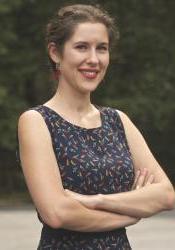
Dr. Annegret Oehme | Captivated by a footnote while reading for my MA thesis in Berlin, I stumbled into the world of Old Yiddish literature. There, I met a Jewish knight named Viduvilt who turned out to be a lesser-known member of King Arthur's Round Table. This odd moment in the margins shaped my research, exploring how premodern German and Jewish storytelling converged in tales about dreadful dragons, singing-dwarves on horseback, and courageous princesses. The lesson I learned proved correct in much of my research: the strangest detours might lead to the most exciting discoveries.
Originally from Zwickau, Germany, I moved to the United States to pursue a Ph.D.. I have since built a career exploring the intersections of medieval and early modern German and Yiddish literature, focusing on cultural transfer within a German-Jewish context. My current book project examines monsters in Old Yiddish literature because the opposite of many heroes is a monster that gives us true insights into the hero, his world, and the audience of the stories.
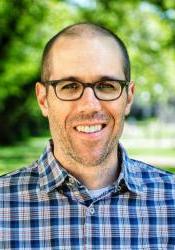
Dr. Ian Schnee | I have always enjoyed talking about movies and video games. When I discovered philosophy, I realized that all along I had been practicing with my friends core humanistic skills: interpretating narratives; using evidence to argue for ambiguous character arcs; evaluating works according to norms of aesthetics, genre, morality, or game play. Philosophy concerns fundamental questions of what it means to be a person: how should we live; what gives our lives meaning; what (if anything) separates human intelligence from artificial intelligence? My work takes films and video games to be philosophical works that insightfully investigate these questions just as much as traditional books and journal articles.
Humanities 102 (Winter 2026) and 103 (Spring 2026)
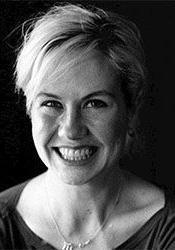
Sarah Stroup, the program director of Humanities First, is a professor in the department of Classics and the chair of the Department of Spanish and Portuguese Studies. Prof. Stroup received her undergraduate degrees from the University of Washington (BA Philosophy; BA Latin and Classical Studies), and her graduate degrees from the University of California, Berkeley MA Latin; PhD Classics). Prof. Stroup is interested in the intellectual and political history of the late Roman Republic, late Republican cryptography and doublespeak, ancient philosophy of science and knowledge, ancient sport and spectacle, and the advanced technologies of the Greeks and Romans. Prof. Stroup is a strong believer in the public, professional, and personal value of a humanities education, where our focus is on strategic and effective communication. Prof. Stroup can be reached at scstroup@uw.edu.

Sam Hushagen received his PhD in English literature from the University of Washington in 2019 after completing a dissertation on early-modern science and descriptive poetry. He researches the connections among poetry written between 1660 and 1850, philosophy of mind, and the history and philosophy of science to show how these areas can be seen in productive conjunction rather than as isolated pursuits. He is currently working on a book about landscape poetry and sense experience, and has published essays in The Wordsworth Circle, The William Carlos Williams Review, and Milton Quarterly. Sam began teaching at UW as a graduate student in the English department in 2013. Before pursuing his doctorate, Sam was a UW undergraduate in English and CHID. He joins Humanities First as an Instructor for Humanities 101, 102 and 103 and as Program Coordinator.